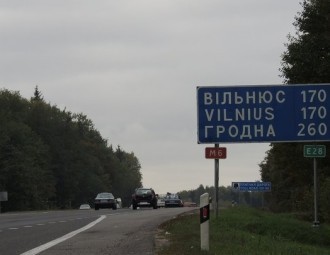Elena Tonkacheva: I will have enough work with Belarus in Vilnius as well

Well, the forced move to Vilnius will somehow complicate the human rights work of the head of the Legal Transformation Center; however, it wouldn’t be complicated to the degree the authorities want it
So, the appeal to the Court of Cassation of Elena Tonkacheva, the president of the board of Lawtrend, against the decision of her deportation from Belarus was considered by the court board for civil cases of the Minsk city court on February 19. Minsk city court upheld the decision re Elena Tonkacheva’s deportation from Belarus for three years. It was the last stage of appeal that could have allowed her to stay in the country.
In the interview with the “EuroBelarus” Information Service Elena Tonkacheva told about her future plans.
- On February 21 I will have to leave to the Russian federation. I am going to Kaliningrad to prepare the necessary documents, such as civil Russian passport. I had never had this document; having been a citizen of Russia who constantly lives in Belarus, I was provided with the Russian passport for travelling abroad. Thus, now my life enters the so-called transitional period, which will last for 2-2,5 months, until all the necessary documents are ready.
- What’s next after the documents are ready in the Russian Federation?
- I will transfer my life and work to the territory of Lithuania, most likely to Vilnius, where there is a number of Lawtrend’s partner organizations that have already offered its help and support, including the organization of the working place and working practice. Practice of cooperation of civil society organizations between Belarus and Lithuania is rather established, so my case is nothing new.
I will fly away on Saturday together with my cat – there is no one here to leave her with, and it is also wrong and inhumane. Now she is a family member; and fortunately, I managed to prepare all the required documents for her.
The main part of my work stays within my activity as the head of the Legal Transformation Center. I will also keep my work in the sphere of international expertise that I have been involved into recently. I think that the amount of the so-called field work will increase – I will be a member of the human rights missions in different regions more often. The amount of work won’t decrease unless I decide so; but I have no plans and no mood to do that. Last months were stressful, both physically and psychologically; I need two-three weeks just to relax.
- What will happen with your house in Lyntupy, apart from change in plans of different fests and plein-airs?
- A house needs constant attention. If one doesn’t treat it with the required attention, in three years it will just fall into decay. Five seasons with my house give quite clear picture what and when should be done there, and what will happen if you don’t do that. I see what is happening at the neighboring houses without the owners – they are decaying before my very eyes. Of course, my friends have already offered their help, but I understand that this is work and not the easiest one. It is kind of uncomfortable for me to burden my friends with that; at worst I will hire someone to support basic order. But I think that 2-3 times during summer the house will be used in educational programs, plein-airs of civil society organizations. I can’t exclude the possibility that the summer school of the “Flying University” will also this season take place there. People that are close to me will visit the house anyway.
-
03.01
-
07.10
-
22.09
-
17.08
-
12.08
-
30.09



























